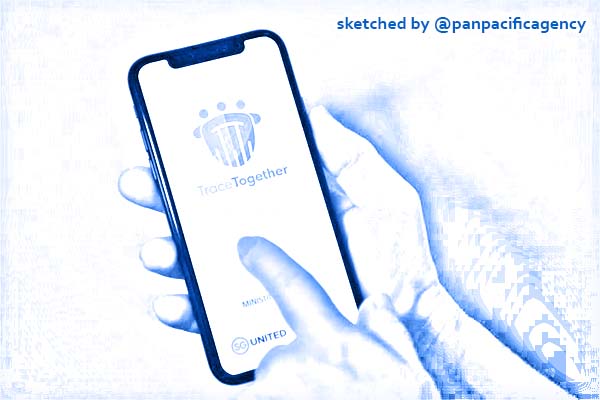Visitors from New Zealand, Brunei must use virus tracing app in Singapore

About 25 per cent of Singapore residents have downloaded the TraceTogether app. ST PHOTO: MARK CHEONG. Sketched by the Pan Pacific Agency.
SINGAPORE, Aug 25, 2020, ST. Visitors from New Zealand and Brunei who successfully apply to come to Singapore will be required to use the TraceTogether app at all times while in the Republic, The Straits Times reported.
They must also retain the app in their phone for 14 consecutive days after leaving Singapore.
This is to facilitate contact tracing should they test positive for Covid-19 during their stay here and within two weeks of their departure.
Should they test positive during this period, they will be required to upload data stored on the app to the Ministry of Health.
The Civil Aviation Authority of Singapore (CAAS) on Tuesday (Aug 25) spelt out the conditions for travel here, following announcements last Friday of Singapore’s decision to unilaterally open up its borders to Brunei and New Zealand.
Instead of having to serve a quarantine period, visitors from the two countries will only need a Covid-19 test upon arrival.
However, they will have to pay their own medical bills should they require treatment for the coronavirus while in Singapore.
CAAS said the travel conditions will help contribute to the “revival of the Singapore air hub in a safe way while minimising risks to public health”.
Interested visitors from New Zealand Brunei can apply for an air travel pass (ATP) online from noon on Sept 1 for entry into Singapore on or after Sept 8.
The application must be done between seven and 30 calendar days prior to their intended date of entry into Singapore.
CAAS said this pass will let the authorities contact interested visitors should there be any changes to Singapore’s health and border measures. It will also help to manage the number of incoming visitors.
Visitors will have to fulfil two other conditions, said CAAS.
First, they must have spent the last 14 days in Brunei or New Zealand before flying to Singapore on direct flights without transit.
In Singapore, they will also have to take private transportation, taxi or private-hire car from the airport to a declared place of accommodation after undergoing the Covid-19 polymerase chain reaction test at the airport.
They will have to remain isolated at the accommodation until the test result is out within 48 hours.
Should they test negative, the visitors will be allowed to go about their activities in Singapore.
To facilitate this process, visitors are strongly encouraged to pre-book and pay the $300 fee for their Covid-19 test online, and refer to the Singapore Hotel Association website for the list of hotels where accommodation is available.
CAAS added that a key priority is still the safety and well-being of passengers, air crew and airport staff, and public health in Singapore.
It added: “Given the evolving nature of the Covid-19 pandemic, the relevant authorities in Singapore may introduce new measures or requirements as and when necessary to safeguard public health.
“This may result in changes to the conditions or cancellation of the ATP at short notice. Applicants will be notified of any such changes or cancellation of their ATP.”
While aviation stakeholders have praised Singapore’s move to unilaterally open up its borders to New Zealand and Brunei without a bilateral agreement in place, the impact of this move is expected to be very limited.
The New Zealand government continues to advise all its citizens not to travel overseas, even as it acknowledged Singapore’s decision to open its borders.
New Zealanders who choose to travel overseas will have to serve a quarantine period of at least 14 days at a government-provided facility when they return home.
They are not allowed to self-isolate or take a domestic flight before the quarantine is completed.
Meanwhile, the Brunei government has said that its citizens, permanent residents and long-term visa holders are restricted from leaving Brunei.
The only exceptions applies to those undergoing urgent medical care overseas, attend court hearings or resuming study abroad.